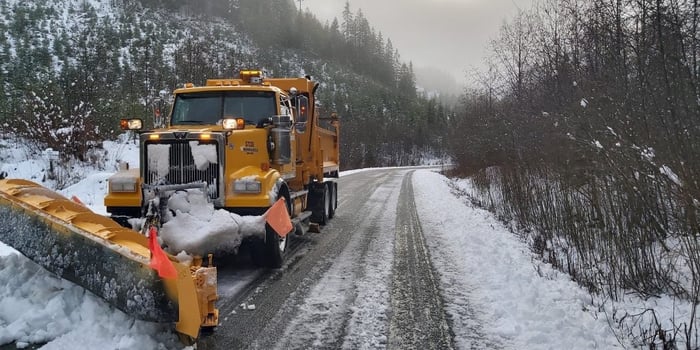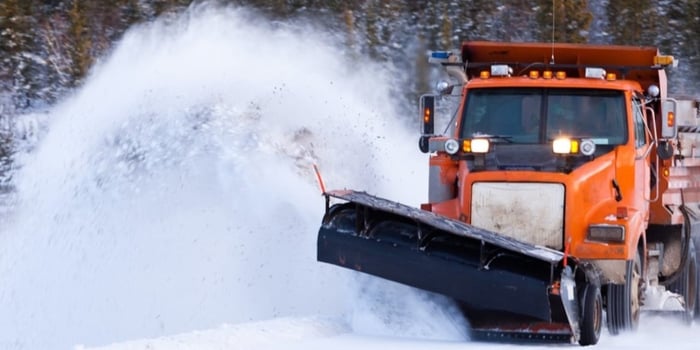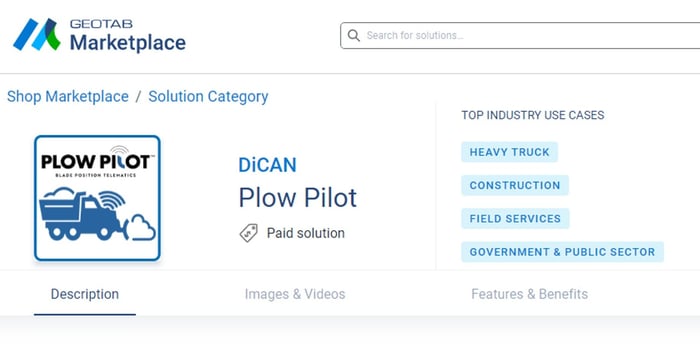
Table of Contents
“there are several primary factors that will likely revert the weather patterns back to pre-1982, a period that was colder and stormier than the past 30-years. - Professor Dilley of GWO
Expect The Unexpected
As the warm embrace of Summer envelops Ontario, the winter snow season might seem like a distant thought for most. However, for fleet managers tasked with the mammoth responsibility of snow removal, now is the critical time to gear up and plan for the challenges that the 2023/24 snow season will inevitably bring. From budget constraints to labor shortages, sustainable practices to risk management, the hurdles are as daunting as they are varied. Early planning and the adoption of innovative technology can significantly alleviate these challenges. This article serves as a call to action, laying out the key challenges that fleet managers must anticipate, and to offer insights into how technological advancements can bolster efficiencies, support sustainability, and ensure safe and effective snow removal operations come winter.
Subscribe Here!
Challenge 1: Budget Constraints and Rising Operational Costs
As the 2023/24 snow season approaches, fleet managers in Ontario need to be mindful of budget constraints and rising operational costs. The aftermath of the pandemic has put municipalities in a tight spot financially. Increased costs due to pandemic-related measures and a downturn in tax revenues from business closures have left many strapped for cash. This crunch has forced delays in replacing aging vehicles, which could lead to higher maintenance costs during the snow season. Moreover, the supply chain disruptions caused by the pandemic have made vehicle deliveries unpredictable, and as municipalities are caught in long fleet funding approval processes, they might not be equipped with the needed vehicles ahead of the next snowfall.
Moreover, municipalities are facing the challenge to “do more with less”. They need to run their existing fleet efficiently while juggling the financial strains. In such a scenario, investing in reliable tools that can help optimize operations can be a wise move. A solution like Plow Pilot by DiCAN, for instance, allows for precise and real-time monitoring of snow plow activity, which provides reliable reporting of plowing supporting operational efficiency and thereby cutting costs. By having a better handle on operations, municipalities can plan ahead and possibly mitigate some of the budget constraints that are bound to arise in the coming snow season.
Challenge 2: Increasing Demand for Sustainable Practices
As the contemporary landscape evolves, there is a burgeoning demand for sustainable solutions in winter operations. Public awareness and regulatory pressures are driving the need for environmentally conscious practices in snow removal. The use of traditional snow removal methods, particularly salt and chemical de-icers, has come under scrutiny due to their detrimental effects on ecosystems. As a consequence, municipalities are compelled to seek alternatives that are not only environmentally benign but also economically viable and efficient. At the very least, spreader material usage should be monitored and optimised.
The case is further made for solutions like Geotab here. By ensuring accurate measurements and tracking of material spreading, Geotab aids in minimizing waste and promoting efficient usage. Furthermore, the data collected through Geotab enables fleets to optimize routes, thereby reducing fuel consumption and emissions. Reports can be generated by Geotab for both of these initiatives to help with planning and execution. This meticulous management of resources not only leads to environmental benefits but also translates into cost savings, making it an indispensable tool for municipalities aiming to embrace sustainable practices in their winter operations.
Case Study: Wellington County, Ontario
The implementation of Geotab's unified, real-time monitoring system in Wellington County, Ontario, has yielded several positive impacts on sustainability. The county upgraded from an outdated GPS track and trace system to leverage Geotab's advanced capabilities, resulting in significant improvements across various aspects of their fleet management.
- Easy Installation and Comprehensive Training: The seamless installation process of the Geotab system ensured minimal disruption and a quick transition for Wellington County.
- Improved Maintenance Staging and Time Savings: The ability to monitor vehicle health and fault codes in real-time allows Wellington County to proactively address maintenance needs. By identifying potential issues before drivers bring the vehicles in for servicing, the county optimizes maintenance scheduling and reduces unnecessary downtime.
- Fleet Usage Monitoring for Future Planning: Geotab's system provides insights into fleet usage, including the number of kilometers driven by each vehicle. These data points facilitate informed decision-making for future fleet planning. This efficient fleet planning contributes to resource conservation, reduced emissions, and cost savings.
Read more on Geotab's website
Challenge 3: Skilled Labour Shortages
It's clear that Ontario and the broader Canadian economy are undergoing significant changes that could potentially affect the availability of skilled labor, including snow plow operators, in the upcoming snow season. After a rocky 2022, the labor market in 2023/24 is expected to be dominated by the mismatch between available jobs and the skills of the available workforce.
Municipalities across Canada are reliant on seasonal workers for snow removal during the winter months. However, the aging population, aka the ‘grey wave’, and urban migration trends are reducing the pool of available workers in these areas. This could lead to service disruptions, including in snow removal services if municipalities are unable to fill these roles as needed. Further exacerbating these labor issues is the tapering but persistent global pandemic, which as we all know has added another layer of complexity to the labor market. These challenges are particularly pronounced in smaller cities and towns, potentially impacting the ability of these municipalities to provide essential services like snow removal. Despite these challenges, Ontario’s labor market continues to show resilience and we’re confident that early planning will help to mitigate some of the expected challenges for the next snow season.
Challenge 4: Risk and Liability Management
Every fleet manager in Ontario knows that the snow removal industry isn't all flurries and hot cocoa. There’s a lot at stake here, and we’re talking about 40,000 contractors operating in a business that's worth a whopping $4.7 billion. That’s a lot of money, a lot of people, and a lot of responsibility on their shoulders. A snow pile in the wrong place can mean catastrophe. One in every three injuries landing folks in the E.R. are due to slips and falls, many of which can be attributed to ice - and when these incidents lead to a lawsuit the situation can get serious. Fast.
It's imperative for fleet managers to employ innovative solutions to mitigate these challenges well before they arise. Using a telematics technology like GeoTab enables meticulous monitoring and data collection, which significantly enhances the precision and safety of snow removal operations. With real-time tracking, fleet managers can swiftly respond to any emerging issues, and accumulate substantial data for compliance and liability documentation. Integrating with a plow blade sensor like the Plow Pilot ensures that detailed records of when and where plow blades were operational can serve as robust evidence in defending against any unwarranted liability claims. These technologies thus not only contribute to streamlining operations but also play a pivotal role in risk management, ultimately safeguarding both financial resources and reputational capital.
Anticipate Challenges, Cultivate Resilience
As the adage goes, “Failing to plan is planning to fail”, and this couldn't be truer for fleet managers looking at each snow season. As we bask in the warmth of summer, the astute fleet manager will use this time judiciously to anticipate and prepare for the challenges that winter invariably brings. With budgetary constraints, environmental concerns, labor shortages, and risk and liability issues at the forefront, a comprehensive and early approach is paramount. Tools like GeoTab and Plow Pilot represent technological lifelines that can be woven into the planning fabric. These solutions enable fleet managers to navigate the tumultuous squalls of the snow season, ensuring not just efficient operations but also environmental sustainability, safety, and compliance. Let this summer be the launchpad for meticulous planning that will see the municipalities of Ontario well-prepared and resilient in the face of the challenges that the 2023/24 snow season will undoubtedly present.





.jpg?length=700&name=frozen-forest-with-rime-snow-and-winter-asphalt-r-2025-03-24-03-33-14-utc%20(1).jpg)